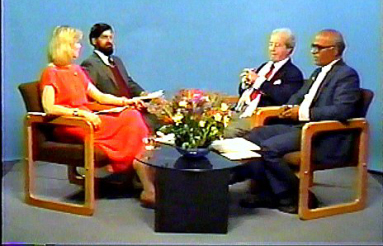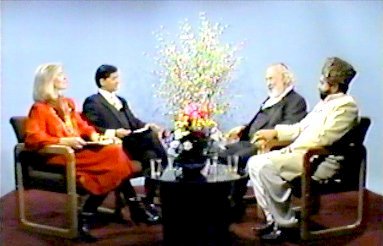
Embrace Foundation is a non-profit,
educational foundation set up to create
better understanding between people of
different religions, cultures, traditions and
world philosophies.
Embrace Foundation works to bring leaders
and scholars of world-wide religions,
cultures and philosophies together by
sponsoring forums, seminars, lectures and
developing an international exchange
program. Embrace Foundation is particularly
concerned with reaching the world public
through the media.
Purpose
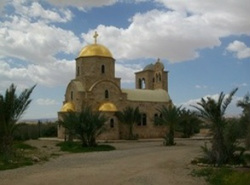
Donations
Embrace Foundation is an all volunteer
organization. All donations go directly to
programs.
Embrace Foundation does not and has
never given permission to any outside
organization to solicit or receive
contributions on our behalf.
All donations should be made to Embrace
Foundation only via Paypal or by mail. All
donations are tax deductible. A receipt will
be emailed to you. Please click on the Pay
Pal link below to Donate.
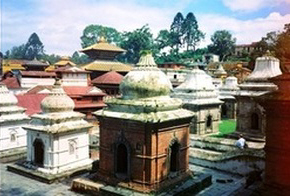
Travel As An Interfaith Act
Embrace encourages all who can do so, to
learn about other traditions and cultures by
traveling as “Grassroots Diplomats.” We
hope that people every where become life
long students of our world-wide humanity.
“ In every man there is something wherein I
may learn of him, and in that I am his pupil.”
R.W.Emerson
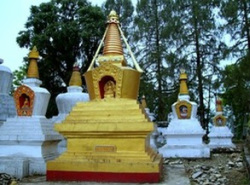

Embrace Humanity
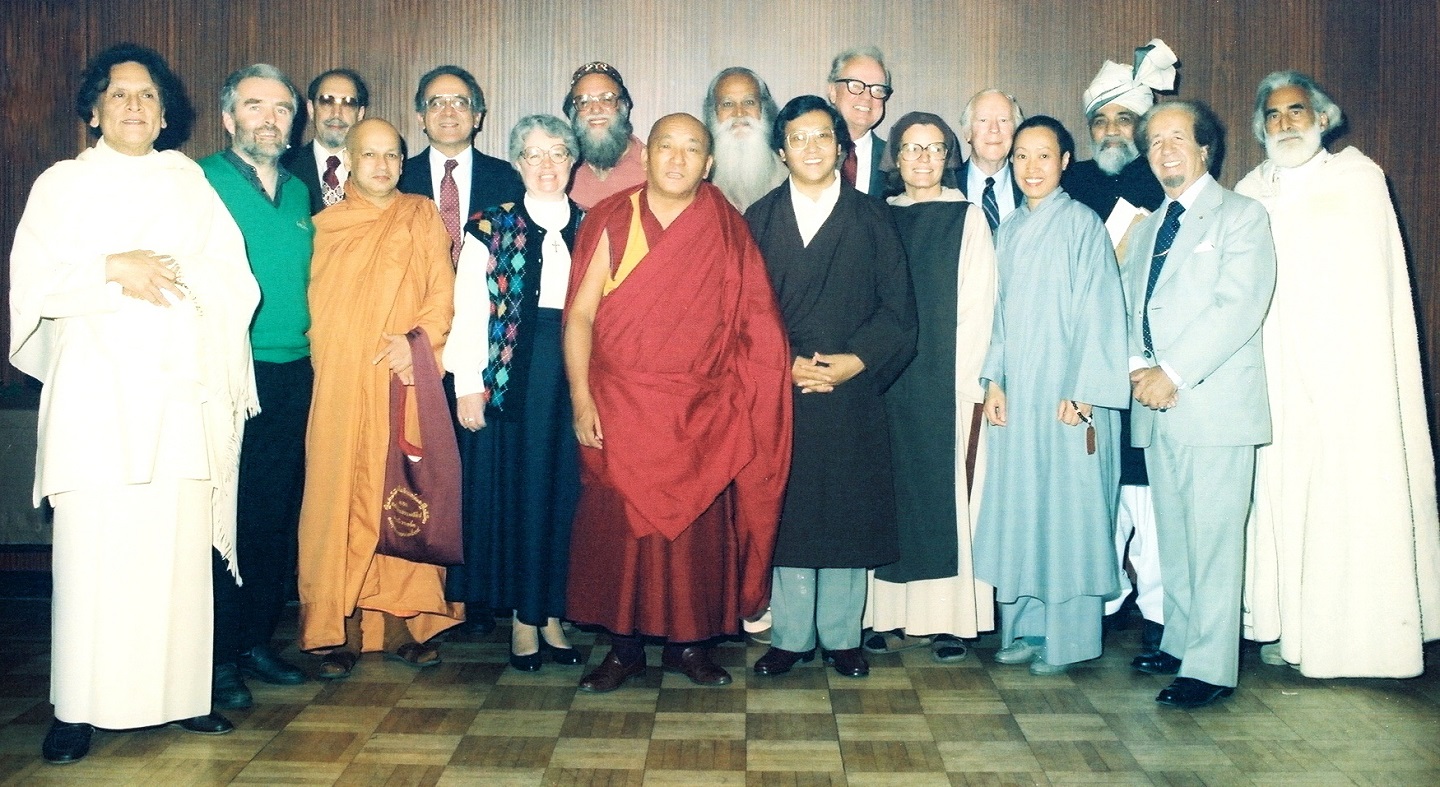
Great Visions - TV
Guests are: Swami Satchidananda &
the Rt. Reverend Dean Parks Morton
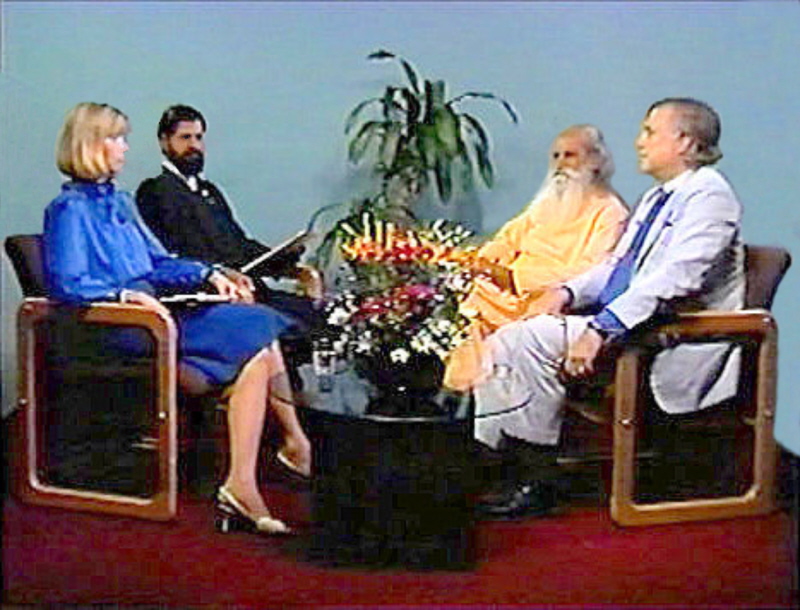
Embrace Archives
Limited Editions Gallery
Umrah - Jordan
Thank you for making a donation.
Embrace Sacred Places
Monastery of Bahira - Syria
Embrace Foundation Universal
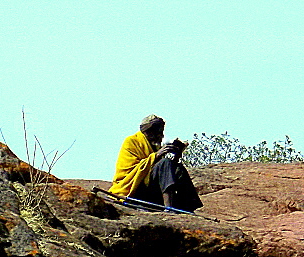
Monk Reading - Ethiopia
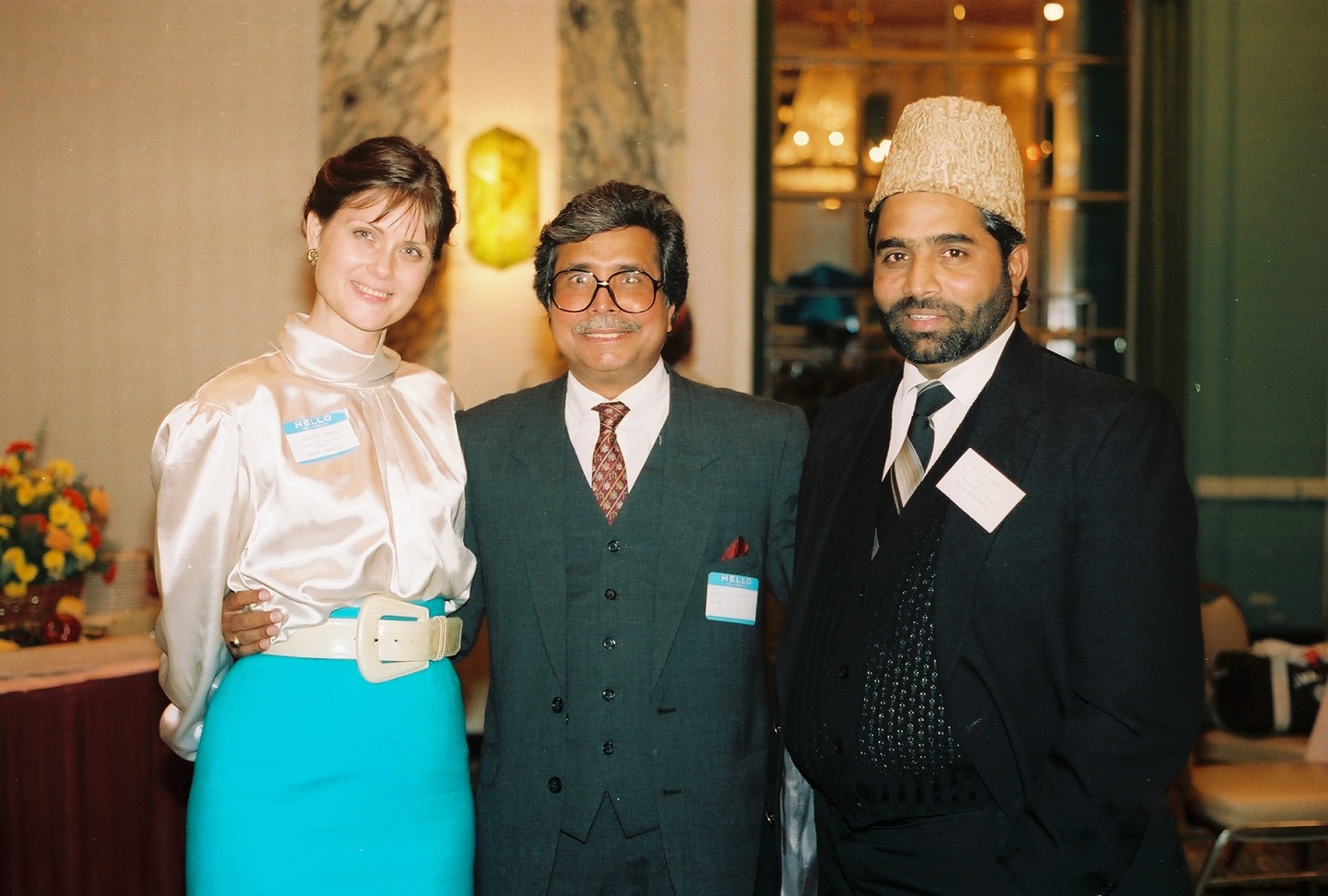
Virginia (Embrace), Dr.Anwar Barkat (World Council of Churches, UN) & Imam I.H. Kauser
Embrace Archives
Great Visions TV
Anne-Stuart & Ajata (Hosts), with Rabbi Gelberman & Dr.Jayaraman
Anne-Stuart & Ajata (Hosts), with Rabbi Carlebach & Imam Kauser
Embrace Foundation International
- Great Visions TV
- Inspirations
- Media
- Possibilities
- Astrophysics, Quantum Physics & The Nature of Reality
- Deconstructing Nuclear Fission & Nuclear Waste
- Defense Industry as Community Builders
- Defense Industry As Energy Providers
- Global Water Shortages
- Innovative Technology
- Intelligent Communities & Development
- Pentagon & Non-Western Nations
- Recreating
- Resource Based Population
- Sharing Community Resources
- Protecting Human Rights
- Spiritual Ecology
- Syria
- Write to Us
Syria
Embrace Foundation does not support ANY political parties, ideology or heads of state any where in
the world. What we do demand is fair, impartial, undistorted reporting that is not propaganda
masquerading as journalism.
Former Qatari PM publicly admits to collusion and coordination between 4 countries,
led by US, to destabilize Syria and support terrorists
Tyler Durden Zero Hedge Sat, 28 Oct 2017 10:00 UTC
A 2013 London press conference: Qatari Prime Minister Sheikh Hamad bin Jassim bin Jabr Al Thani with U.S. Secretary of
State John Kerry. A 2014 Hillary Clinton email confirmed Qatar as a state -sponsor of ISIS during that same time period.
A television interview of a top Qatari official confessing the truth behind the origins of the war in Syria is going viral across
Arabic social media during the same week a leaked top secret NSA document was published which confirms that the
armed opposition in Syria was under the direct command of foreign governments from the early years of the conflict.
And according to a well-known Syria analyst and economic adviser with close contacts in the Syrian government, the
explosive interview constitutes a high level "public admission to collusion and coordination between four countries to
destabilize an independent state, [including] possible support for Nusra/al-Qaeda."Importantly, "this admission will help build
case for what Damascus sees as an attack on its security & sovereignty. It will form basis for compensation claims."
As the war in Syria continues slowly winding down, it seems new source material comes out on an almost a weekly basis
in the form of testimonials of top officials involved in destabilizing Syria, and even occasional leaked emails and documents
which further detail covert regime change operations against the Assad government. Though much of this content serves
to confirm what has already long been known by those who have never accepted the simplistic propaganda which has
dominated mainstream media, details continue to fall in place, providing future historians with a clearer picture of the true
nature of the war.
This process of clarity has been aided - as predicted - by the continued infighting among Gulf Cooperation Council (GCC)
former allies Saudi Arabia and Qatar, with each side accusing the other of funding Islamic State and al-Qaeda terrorists
(ironically, both true). Increasingly, the world watches as more dirty laundry is aired and the GCC implodes after years of
nearly all the gulf monarchies funding jihadist movements in places like Syria, Iraq, and Libya.
The top Qatari official is no less than former Prime Minister Hamad bin Jassim bin Jaber al-Thani, who oversaw Syria
operations on behalf of Qatar until 2013 (also as foreign minister), and is seen below with then-Secretary of State Hillary
Clinton in this Jan. 2010 photo (as a reminder, Qatar's 2022 World Cup Committee donated $500,000 to the Clinton
Foundation in 2014).
In an interview with Qatari TV Wednesday, bin Jaber al-Thani revealed that his country, alongside Saudi Arabia, Turkey, and
the United States, began shipping weapons to jihadists from the very moment events "first started" (in 2011).
Al-Thani even likened the covert operation to "hunting prey" - the prey being President Assad and his supporters - "prey"
which he admits got away (as Assad is still in power; he used a Gulf Arabic dialect word, "al-sayda", which implies hunting
animals or prey for sport). Though Thani denied credible allegations of support for ISIS, the former prime minister's words
implied direct Gulf and US support for al-Qaeda in Syria (al-Nusra Front) from the earliest years of the war, and even said
Qatar has "full documents" and records proving that the war was planned to effect regime change.
According to Zero Hedge's translation, al-Thani said while acknowledging Gulf nations were arming jihadists in Syria with
the approval and support of US and Turkey: "I don't want to go into details but we have full documents about us taking
charge [in Syria]." He claimed that both Saudi Arabia's King Abdullah (who reigned until his death in 2015) and the United
States placed Qatar in a lead role concerning covert operations to execute the proxy war.
The former prime minister's comments, while very revealing, were intended as a defense and excuse of Qatar's support for
terrorism, and as a critique of the US and Saudi Arabia for essentially leaving Qatar "holding the bag" in terms of the war
against Assad. Al-Thani explained that Qatar continued its financing of armed insurgents in Syria while other countries
eventually wound down large-scale support, which is why he lashed out at the US and the Saudis, who initially "were with
us in the same trench."
In a previous US television interview which was vastly underreported, al-Thani told Charlie Rose when asked about
allegations of Qatar's support for terrorism that, "in Syria, everybody did mistakes, including your country." And said that
when the war began in Syria, "all of use worked through two operation rooms: one in Jordan and one in Turkey."
Below is the key section of Wednesday's interview, translated and subtitled by @Walid970721. Zero Hedge has reviewed
and confirmed the translation, however, as the original rush translator has acknowledged, al-Thani doesn't say "lady" but
"prey" ["al-sayda"]- as in both Assad and Syrians were being hunted by the outside countries.
The partial English transcript is as follows:
"When the events first started in Syria I went to Saudi Arabia and met with King Abdullah. I did that on the instructions of his
highness the prince, my father. He [Abdullah] said we are behind you. You go ahead with this plan and we will coordinate but
you should be in charge. I won't get into details but we have full documents and anything that was sent [to Syria] would go to
Turkey and was in coordination with the US forces and everything was distributed via the Turks and the US forces. And us
and everyone else was involved, the military people. There may have been mistakes and support was given to the wrong
faction... Maybe there was a relationship with Nusra, its possible but I myself don't know about this... we were fighting over
the prey ["al-sayda"] and now the prey is gone and we are still fighting... and now Bashar is still there. You [US and Saudi
Arabia] were with us in the same trench... I have no objection to one changing if he finds that he was wrong, but at least
inform your partner... for example leave Bashar [al-Assad] or do this or that, but the situation that has been created now will
never allow any progress in the GCC [Gulf Cooperation Council], or any progress on anything if we continue to openly
fight."
As is now well-known, the CIA was directly involved in leading regime change efforts in Syria with allied gulf partners, as
leaked and declassified US intelligence memos confirm. The US government understood in real time that Gulf and West-
supplied advanced weaponry was going to al-Qaeda and ISIS, despite official claims of arming so-called "moderate" rebels.
For example, a leaked 2014 intelligence memo sent to Hillary Clinton acknowledged Qatari and Saudi support for ISIS.
The email stated in direct and unambiguous language that:
"the governments of Qatar and Saudi Arabia, which are providing clandestine financial and logistic support to ISIL and other
radical Sunni groups in the region."
Furthermore, one day before Prime Minister Thani's interview, The Intercept released a new top-secret NSA document
unearthed from leaked intelligence files provided by Edward Snowden which show in stunning clarity that the armed
opposition in Syria was under the direct command of foreign governments from the early years of the war which has now
claimed half a million lives.
The newly released NSA document confirms that a 2013 insurgent attack with advanced surface - to - surface rockets
upon civilian areas of Damascus, including Damascus International Airport, was directly supplied and commanded by
Saudi Arabia with full prior awareness of US intelligence. As the former Qatari prime minister now also confirms, both the
Saudis and US government staffed "operations rooms" overseeing such heinous attacks during the time period of the 2013
Damascus airport attack.
No doubt there remains a massive trove of damning documentary evidence which will continue to trickle out in the coming
months and years. At the very least, the continuing Qatari-Saudi diplomatic war will bear more fruit as each side builds a
case against the other with charges of supporting terrorism. And as we can see from this latest Qatari TV interview, the
United States itself will not be spared in this new open season of airing dirty laundry as old allies turn on each other.
https://www.sott.net/article/365745-Former-Qatari-PM-publicly-admits-to-collusion-and-coordination-between-4-countries-led-
by-US-to-destabilize-Syria-and-support-terrorists
Media Disinformation and the Framing of the Syrian War
By James Corbett and Prof Michel Chossudovsky
Global Research
Region: Middle East & North Africa
Theme: Media Disinformation, US NATO War Agenda
In-depth Report: SYRIA: NATO'S NEXT WAR?
Months after the events took place, Pulitzer prize winning journalists and others are finally reporting about the lies and
manipulations of the US government regarding the recent chemical weapons attack in Syria. Far from shining a light on the
true situation in the country, however, these reports continue to avoid the underlying causes and explanations for what is
happening in Syria, and the forces that are behind it. This is the GRTV Backgrounder on Global Research TV.
The architects of our modern system of manufactured consent and official propaganda have long known the importance of
the mass media in framing public opinion on any given event. To the pathocrats who blazed the trail toward our modern era
of information warfare and opinion control, facts themselves were malleable, subject not to objective reality but to the way
they were perceived and internalized by a credulous public. As Ivy Lee, the man that the Rockefellers hired to invent the
modern PR industry after the Ludlow massacre, put it:
“It is not the facts alone that strike the popular mind, but the way in which they take place and in which they are published
that kindle the imagination…Besides, what is a fact? The effort to state an absolute fact is simply an attempt to…give you
my interpretation of the facts.”
. . . Sadly, recent events have provided no shortage of examples of this phenomenon. In the early days of the Iraq War,
media analyst Andrew Tyndall examined 414 news stories aired by ABC, CBS, and NBC about the build up to the war,
finding that 380 of them, a staggering 92%, sourced back to one of three U.S. government agencies: the White House, the
State Department and the Pentagon. A further study found that of 574 stories aired between Bush’s speech to the UN in
September 2002 and the beginning of the Iraq war in March 2003, only 12 stories, just 2%, dealt with the possible aftermath
of the invasion.
Perhaps unsurprisingly, a remarkably similar pattern has played out in the years-long propaganda campaign to convince
the American, British and Western public in general of the need for armed intervention in Syria. A September 2013 study
from Pew Research found that in the wake of the chemical weapons attack in Ghouta in August, the coverage of the Syrian
war debate on cable news networks from supposedly different viewpoints was almost identical. The study found that Al
Jazeera America, CNN, and BBC America all framed their reports in substantially similar ways and relied on substantially
similar sources, including by far their most common three sources: the White House, the congress, and the military. A
further study in October of this year by the Public Accountability Initiative found that many of the so-called Syria “experts”
relied on by the western media to provide commentary on the Syrian conflict had direct financial ties to the defense
industry, exactly as had been previously exposed in coverage of the Iraq war.
None of this is surprising to those who have been following the media coverage of the Syrian conflict from the beginning.
Indeed, alternative media pundits have been pointing out the obviously biased coverage of the conflict since its very
inception.
The beginning of the campaign to frame public opinion on Syria can be traced back at least as far as 2006, when the Bush
administration first approved US government funding and training for opposition forces in the country, but began in earnest
after the conflict broke out in 2011.
From the early days of the Syrian conflict, Western media outlets including CNN relied on dubious activist Danny Dayem,
known as “Syria Danny,” for coverage on the ground in the war-torn country. However, after Syria Danny was exposed
staging his reports, Anderson Cooper invited him on his program, not to explain why he was staging fictitious reports, but
how the evidence of that fakery made its way onto the internet.
In March 2012, several key staff from Al Jazeera’s Beirut bureau, including the bureau’s managing director, a correspondent
and a producer, all resigned in protest of the network’s bias in its coverage of the Syria conflict.
In August of 2012, the BBC released a video report showing members of the Syrian terrorist insurgency planning to trick a
prisoner into becoming an unwitting suicide bomber, a war crime under the Geneva Conventions. After independent media
started to draw attention to the clip, it was quickly removed from the BBC website and copyright violations were posted on
YouTube copies of the footage.
And in the wake of the recent Syrian chemical weapons attack, the BBC aired an interview with a dubious medical expert
that appeared to have had its soundtrack drastically altered in two different versions of the interview broadcast in separate
reports.
As Michel Chossudovsky, director of The Centre for Research on Globalization in Montreal, points out, however, as
egregious as these manipulations are, even the more “balanced” critiques such as Seymour Hersh’s recent reporting on
the US government’s manipulation of its intelligence over the chemical weapons attack in Ghouta, still exclude the key
information which would help the public understand what is really happening in Syria.
Perhaps the most remarkable thing about the Syrian war coverage of the mainstream media is not its underlying bias-that
was always to be expected-but how remarkably ineffective that coverage has been in convincing the public of the need for
military intervention in the country. After nearly three years of relentless propaganda attempting to convince the public of the
virtue of the terrorist insurgency and the incomparable evil of Assad, the seemingly inevitable march toward war in the wake
of the Ghouta chemical weapons attack faltered after public opinion overwhelmingly came down on the side of non-
interventionist policies. *CLIP
Perhaps reading public sentiment, many mainstream outlets even took to pointing out the media bias on the war and trying
to retroactively position themselves against military intervention. This has to be credited to a remarkable, global, grassroots
phenomenon of independent citizen media breaking through the layers of propaganda to provide true, cogent analysis of the
situation on the ground in Syria. In the face of generations swayed by the mass media manipulation of Ivy Lee and his
ideological progeny, this alternative media movement is setting the foundation for an alternative paradigm in which Lee’s
cynical rhetorical question “What is a fact?” has a very different answer than that which the ruling classes would want us to
believe.
Link to the article:
The Embrace editors would like to state, that factual reporting, free of propaganda is becoming increasingly difficult to find
in the Western Media including broadcast media sponsored by government institutions in countries such as Britian and the
United States. However, for those who would like to understand what is actually going on in these countries, there are
reporters and serious information talk show hosts from across the political spectrum in the U.S. - from conservative to
progressive to libertarian that have remained unstintingly truthful and have resisted bribes, blackmail and persevered
despite being spied on.
From the Conservative side there is Pat Buchannan
From the Libertarian side there is Justin Raimondo
From the Liberal side is Seymour Hersh
From the Progressive side is Bill Moyers
There is also Paul Craig Roberts, who like Prof. Michel Chossudovsky are occasionally more passionate in their language,
but who non-the-less speak the truth.
In 2010 the Embrace Founders went to Syria primarily because there had been for some years an onslaught of propaganda
in the U.S. media, following the destabilization of Iraq to invade and bomb Lebanon, Syria and Iran.
Regardless of whatever else the Syrian government has done, within Syria the support of religious freedom was admirable.
The Founders were delighted to spend time in Sunni mosques, Shia mosques and Christian Churches in some cases
sharing in these spaces with people from entirely different religious backgrounds.
The Embrace Founders know two things about pre-war Syria. One, people of all different faiths got along well and two, the
grassroots people owned no weapons.
The question then is, "Who was it, that was firing weapons at the army from the demonstrating crowds??? "
Please read the following articles on Syria: One is from the BBC, one of the few articles from this outlet which represents
straight and unbiased journalism, and the other is from The National, based in Dubai.
25 October 2012 Last updated at 09:30 ET
Syria crisis: Discord grows between Islamist and secular rebels
By Lina Sinjab BBC News, Damascus
Um Ahmad was the first woman to join the protests in Douma, a town on the eastern outskirts of Damascus.
She is 22 years old and Um Ahmad is not her real name, but nobody likes to give
their real name in Syria these days.
Wearing a veil under her pink coat, she lights a cigarette and recalls the first days of the movement.
"I used to go door-to-door knocking on women's houses to encourage them to take to the street," she said.
Though Um Ahmad presents herself as a member of the conservative Islamist Salafi movement, she and her fellow
protesters were not calling for a state ruled by Sharia law.
"We were going out for our call for freedom, democracy and a civil state," she explained.
Lack of unity
Um Ahmad has been detained before and is now in hiding after joining Free Syrian Army (FSA). "The only way forward is to
fight this regime with weapons," she said.
She joined the ranks of the Ghouta Revolutionaries brigade, part of the Damascus suburb's military council, helping with
logistics.
"I joined the Ghouta Revolutionaries because this brigade doesn't have a conservative Islamic name, not like the rest of the
brigades across the country," she explained.
The eastern suburbs of Damascus, known as Eastern Ghouta, have always been seen as the conservative part of the city.
In most parts it is hard to find a woman who is not veiled.
That is especially true in Douma, a town that has around 800,000 inhabitants.
Douma was the first area in the suburbs to witness anti-Assad demonstrations back in March in 2011, only one week after
protests were broken up by the authorities in the flashpoint town of Daraa.
On 24 March, the people who demonstrated in Douma were not only townspeople but young students of different religious
and social backgrounds from across the country. They met at the university dormitory and went out to protest together.
But now the scene is very different.
"There are various FSA brigades in Douma and most of the time they don't coordinate with each other," Um Ahmad said.
"The one that is most powerful and more organised is Liwaa al-Islam. They are the ones with the biggest funding and more
weapons".
Sharia courts
Liwaa al-Islam is a conservative group applying Islamic Sharia. And this is what many in Syria - including many in the the
opposition - do not want to see.
"They have set up a Sharia court and they prosecute whoever they suspect as an agent of the regime or amongst the
security themselves. In most cases they are killed," Um Ahmad said.
Liwaa al-Islam is getting most of its funding from Saudi Arabia, mostly from Syrians living in the kingdom.
They are also reported to have weapons which they have taken from regime forces.
Abdulwahed, who is close to the group, recently joined the FSA after his home was destroyed by government shelling. "We
have got nothing else to lose, we have to fight and we only have hope in God to help us topple this regime."
When asked about Islamic law being implemented, he did not see a problem in that. "They now have judges who are
looking into each case and they are not killing the captured anymore, but referring them to the Sharia court".
But there are growing concerns within opposition groups about the potential spread of Sunni extremism in a country with a
diverse religious make up.
"The rebels who refuse to hold the al-Qaeda flag and don't have an extremist ideology are poorly funded," Um Ahmad said.
"I am a Salafi by belief but I don't have the extremist ideology that's being imposed on the rebels by the Saudis. I fear these
Islamist are going to prevail with their own extremist ideology in Syria."
Those are the fears of an opposition Salafi woman. The concern is much greater amongst secular political opposition.
"The violence has got us nowhere," said one opposition activist with a secular background who has been working on
peaceful means of change.
"The regional players are manipulating our revolution and arming those who would only accept radical ideologies."
Extremism fears
This is exactly what the government in Syria has been warning its supporters and the world about.
Since the beginning of the crisis, the regime has claimed that Salafis and extremists groups are threatening the secular
state that it is protecting.
It recently started talking about an al-Qaeda presence in Syria and foreign jihadis
coming to carry out acts of terrorism.
What started out as scare-mongering on the part of the government has now become a reality, with al-Qaeda elements
and foreign jihadis fighting in Syria.
It is something Western governments who want to see the fall of the Assad regime are alarmed by.
Mark C Toner from the US State Department told the BBC: "We've been very vocal about our concerns that the kind of
environment that the Syrian government has created leads to these kinds of groups exploiting the situation and trying to
gain a foothold.
"We stand clearly on the side of non-violence. We want to see the Syrian opposition make a peaceful political transition,
and that's where our support is focused."
But there is nothing on the ground at present that suggests anything is being done to achieve that. Meanwhile Gulf states
who are allied to the US are the ones being blamed for focusing their funding on extremist groups.
"Those men with the FSA who refuse to follow the radical Islamist ideology are poorly armed," the secular opposition
activist told me. "Sometimes they can't even find enough money to feed themselves."
This article is an observation of religious freedom in pre-war Syria.
Syrian Armenians:
'Our enemy's flag made us happy, but ashamed'
Justin Vela
YEREVAN // Hovig Asmaryan said he and his family were initially ashamed by their happiness when they finally caught sight
of the Turkish flags flying on Syria's border with Turkey.
Syrian Armenians from Aleppo, they fled late in September in a nine-car convoy. For Mr Asmaryan and the others in the
convoy, the flags signified they had escaped the nightmare their lives had become during the 20-month Syrian conflict.
But the sight also brought back memories of the what Armenians consider a genocide - the 1915 massacre of millions of
Armenians by Ottoman Turks - that sent the previous generation fleeing for safety to Syria.
Please read the rest of the article -
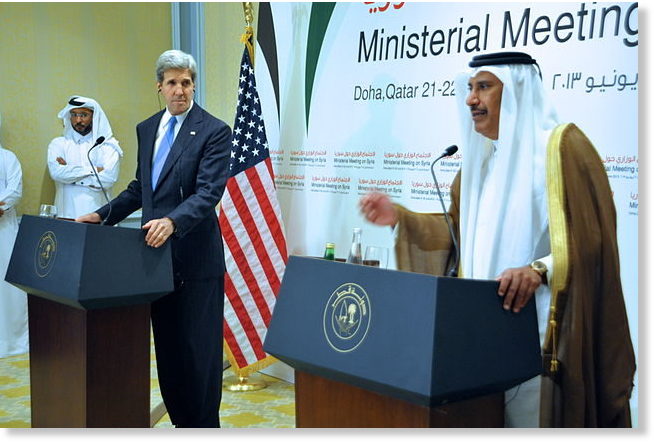


Embrace Foundation Retreat Center
Embrace.Foundation (skype messaging) - 011+1+212.675.4500 (New York)
Click to Email Us
